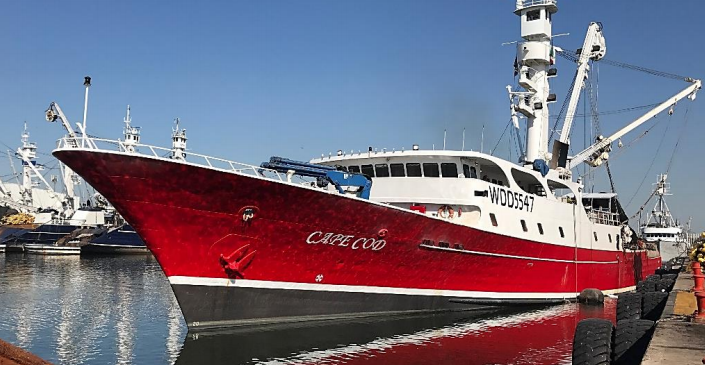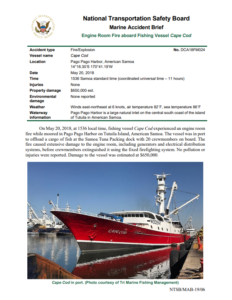The US National Transportation Safety Board (NTSB) issued an investigation report on an engine room fire onboard the fishing vessel ‘Cape Cod’, while moored in Pago Pago Harbor on Tutuila Island, American Samoa, in May 2018.
The incident
On 20 May 2018, at 1536 local time, fishing vessel Cape Cod experienced an engine room fire while moored in Pago Pago Harbor on Tutuila Island, American Samoa.
The vessel was in port to offload a cargo of fish at the Samoa Tuna Packing dock with 20 crew members onboard.
The fire caused extensive damage to the engine room, including generators and electrical distribution systems, before crew members extinguished it using the fixed firefighting system.
No pollution or injuries were reported, but damage to the vessel was estimated at $650,000.
Probable cause
The National Transportation Safety Board determines that the probable cause of the engine room fire aboard fishing vessel Cape Cod was an undetermined electrical ignition source near electrical distribution cabling in the lower engine room.
Analysis
Based on the location of the damage in the engine room, the intensity of the fire observed in the CCTV footage, and the lack of operating machinery near generator no. 2, investigators concluded that the fire likely resulted from an electrical source and was fueled by electrical cable housing material, control boxes, light fixtures, and paint.
The vessel had recently undergone extensive work in the engine room, although with no subsequent regulatory or classification society drydock exam or sea trial, NTSB noted.
The Coast Guard promulgates regulations for commercial fishing vessels in Title 33 Code of Federal Regulations Part 28, but these vessels are not inspected or issued a certificate of inspection.
The Coast Guard does not normally attend the vessels during drydock periods nor during major repairs and upgrades. Operators may instead request that the Coast Guard conduct a dockside safety exam, which has been mandatory since 2010 for vessels of this size and service.
In 2012, legislation extended the required exam interval to 5 years; however, the Coast Guard still recommends biannual safety exams.
The Cape Cod last had a dockside safety exam in October 2014. During this exam and also during the prior one (in 2013), the Coast Guard identified electrical and fixed firefighting deficiencies, which were subsequently cleared.
The Cape Cod’s owner had requested a new safety exam, but it had yet to be scheduled when the fire occurred.
The 2010 legislation also required new vessels of this size and service to meet survey requirements of a classification society. The same legislation required compliance with load line regulations and therefore an annual survey.
Existing vessels such as the Cape Cod were grandfathered and did not have to meet these requirements.
The Coast Guard has published a yet-to-be-finalized 2016 Notice of Proposed Rulemaking to implement requirements of the new statutes.
The fixed firefighting system aboard the Cape Cod functioned as designed, and the crew demonstrated competency in activating the system and promptly sounding the alarm. It is important with such systems to shut off all ventilation sources to the space to prevent loss of CO2 and resupply of fresh air. It is also vital to account for everyone before activating the system. The crew’s early and correct use of the fixed system, including shutting down the ventilation, successfully contained the fire to a corner of the engine room and limited the damage to the vessel,
…the report reads.
Explore more herebelow:































































